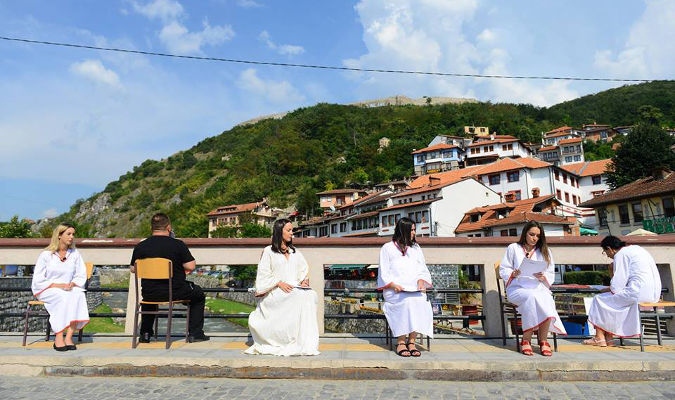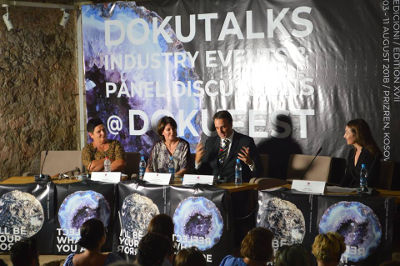Conflict-related sexual violence and ending stigma spotlighted at Dokufest in Kosovo
Nearly 20 years after hostilities ceased in 1999, conflict-related sexual violence takes centre stage in Kosovo.Date:

On 9 August, Dokufest, a major international documentary and short film festival held annually in Prizren, in the southwest of Kosovo[1], shone a light on conflict-related sexual violence (CRSV) with two UN Women-supported activities.
Nearly 20 years after hostilities ceased in 1999, a culture of shame and silence in Kosovo continues to stigmatize survivors of conflict-related sexual violence, who until recently had no legal recognition or rights and were unable to get reparations for the violence they suffered.
Supported by UN Women, under the umbrella of the Gender Sensitive Transitional Justice project, funded by European Union, the Addressing Conflict-related Sexual Violence activities at Dokufest included testimony and story-telling, and a high-level panel.
In Your Story is My Story, six performers read aloud stories by women and men who survived sexual violence during the Kosovo conflict. Held on one of Prizren’s main bridges, Your Story is My Story was an emotional, moving performance that held audience members rapt as it gave voice to the silent suffering CRSV survivors in Kosovo continue to endure, often ignored by the society.
Organized by the local NGO THY, in collaboration with Integra, Forum ZFD, Dokufest and supported by UN Women, Your Story is My Story asked the audience to reflect on Kosovo CRSV survivors’ past and present. Its bridge setting symbolised how the wartime crimes kept CRSV survivors stuck between past and future and prevented them – and society – from healing and moving on. By giving survivors voice, Your Story is My Story involved the audience in a collective exercise to learn the truth about what happened and lessons from history, to prevent future similar violence and human rights violations.

Also that day, the high-level panel Justice – A Way to Fight Stigma, organized by Jahjaga Foundation with support from UN Women, discussed the persistent challenges of stigma and denied access to justice faced by CRSV survivors in Kosovo.
“The bodies of women were transformed into arenas of war,” said panellist Atifete Jahjaga, former President of Kosovo.
The first couple of weeks of her presidency were the most difficult, Ms. Jahjaga said, as she met regularly with CRSV survivors and understood their suffering while being an executive with a parliament that was not very responsive to the needs of the survivors. Noting the lack of access to justice for the survivors, Ms. Jahjaga said: “We must stop the continuous stigmatization and pointing of fingers at the survivors and instead point these same fingers at the perpetrators of the crimes.”
“I am angry, very angry about the conditions of the survivors,” said Ruairi O' Connell, UK Ambassador to Kosovo, who expressed frustration at CRSV survivors’ long wait for justice and recognition of their suffering, while being deeply impressed by their strength and unwillingness to give up.
“It is an achievement that CRSV is now talked about publicly,” said Mr. O’Connell. “This is an initial step towards visible and tangible effects. Finally, Kosovo recognizes the injustice and crime the survivors lived through, but this does not suffice at all.”
Ambassador O’Connell emphasized the importance of providing justice, as impunity generates a system that does not prevent future similar atrocities and ending stigma: “Survivors should never feel embarrassed for what happened to them; on the contrary we should feel embarrassed for stigmatizing them.”
Flora Macula, Head of UN Women Office in Kosovo, noted the importance of documenting and collecting data on CRSV crimes and called for greater coordination and cooperation between the actors involved in CRSV justice: “There are only two war crimes prosecutors in Kosovo, and only one deals with CRSV. UN Women has been supporting the Special Prosecution Office of Kosovo with capacity building for several years, but efforts to empower the war crimes prosecution office are largely absent.”
While the first beneficiaries have started receiving their reparations, said Ms. Macula, “no money in the world could alleviate the suffering of the CRSV survivors. There will never be stable peace if survivors do not see justice – we can only achieve sustainable peace when justice and freedom are enjoyed by all.”
[1] All references to Kosovo on this website shall be understood to be in full compliance with UN Security Council Resolution 1244 (1999).